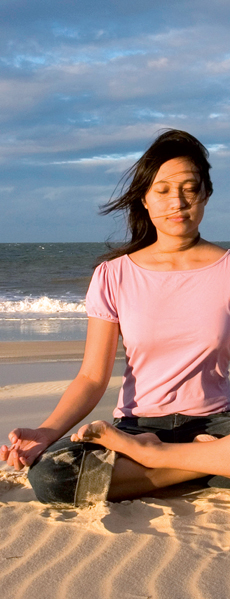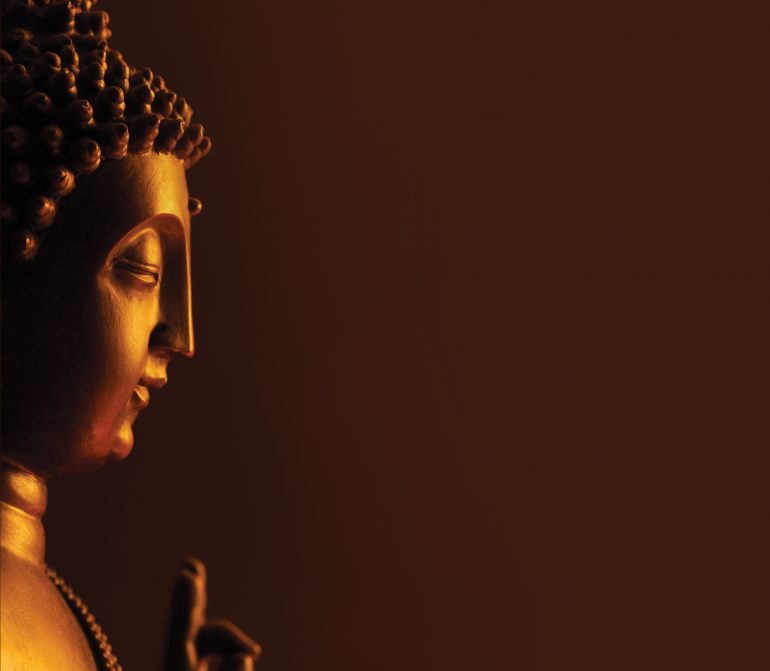Even after almost thirty years of teaching meditation, I still am amazed at how much more there is to say about it. Words simply cannot communicate some of the marvelous experiences which it is our birthright as human beings to look forward to as contemplation deepens. Until you yourself get into the submarine that is meditation and enter the dark waters of the mind, far below the glittering surface of consciousness, there is no way to fathom these experiences. But even those who meditate sincerely and systematically face serious obstacles which must be overcome before they can penetrate the recesses of this vast, uncharted ocean that is the mind.
The Buddha enumerates five such obstacles: sensuality, ill will, laziness, restlessness, and anxiety or fear. Each of these locks us out of deeper consciousness. Like an inner tube around a swimmer’s waist, these five obstacles keep us from diving below the surface of the mind by entangling us in the thoughts and experiences of the outside world.
1. Sensuality
“Sensuality,” in the Buddha’s language, is not a term of moral judgment. It refers simply to our human tendency to become entangled in the impressions of our senses – to become so attached to what brings sensory pleasure or pain that we lose real freedom of choice. This is a normal biological response, but when we are trying to enter and master the world within, it keeps us oriented in just the wrong direction. To turn inward, we have to detach ourselves from the hold the senses have on the mind; there is no other way.
The Buddha gave us a useful rule of thumb for dealing with the senses: neither asceticism nor overindulgence. Don’t do everything your senses tell you, he would say, but don’t try to starve them into submission either. Train them to be your friends and allies. That is what the Buddha called the Middle Path, the road to health and happiness for everybody.

“Don’t do everything your senses tell you, the Buddha would say, but don’t try to starve them into submission either. Train them to be your friends and allies.”
When I try to apply this today, I usually begin with the compulsive urge to eat when it is not necessary. When you are hungry, eat what is best for your body. Eating at any other time shows very slight regard for health, and the mind becomes obese and tyrannical when it gets its way like this at the expense of our better judgment.
Simply put, in the matter of food, following the Middle Path means taking a healthy interest in food but not making food the end of life. I enjoy good food when it is time to eat, but until mealtime comes I don’t think about food at all.
Advertisers, by contrast, seem to want us to think about eating twenty-four hours a day. Whenever I go to the supermarket, I notice how the covers of many popular magazines display endless varieties of sweets. Under their influence it is very easy to get into the habit of bringing home this little treat and that little tidbit to munch on. Even if you don’t have an eating problem, this habit of automatic buying and snacking takes a real toll on the mind. It weakens the will, divides attention, and keeps thoughts turned outward toward the sense-world – just the opposite of what we need to enter the world within.
If you love your children, I would say, don’t get them into the “sweets” habit at all – and if you love adults, don’t encourage them in it. On a special occasion, I do sometimes treat my teenage friends to a gooey chocolate confection. They can take it. But it’s not a special occasion every time we can find a convenient excuse. If every event is celebrated with chocolate or candy, a lot of calories are going to find a home around somebody’s waist.
If I may say so, as spiritual teachers go, I am really very lenient in these matters. The important thing is to remain clear about your goal; then it is easy to keep a reasonable perspective.
Like many Indians, for example, I still enjoy tea – in fact, friends have given me a special blend that is a favorite of the British royal family. (You may compliment me on my good taste.) I enjoy my mid-afternoon cup of “the beverage that cheers but does not inebriate.” On the other hand, the moment I find my mind looking forward to teatime or taking it for granted, I change my routine, which keeps my mind on its toes. I am concerned about caffeine, but my first concern is the mind. Too much tea can injure the nervous system, but anger does much more harm. If you give up anger, you can even drink coffee now and then. These are all matters of common sense.
For most people, this same artistry can be applied with alcohol. When I go to a wedding I toast the bride and groom with champagne, but on other occasions I simply decline. You may find this awkward at first, but you will be guarding your mind against getting caught in a sensation, which can happen so gradually that you may not even notice. Nobody has ever been offended when I said “No, thank you” at a party where drinks were being served. I don’t think anybody ever thought I was a wet blanket. Almost everybody respected my position – partly, I think, because I passed no judgment on others.
I have had many friends who were victims of alcohol but freed themselves from its power through the practice of meditation. One of them paid me a great compliment: “You’re a good sport. You never hit below the belt.” I know how hard these habits are to give up; I know that the further they progress, the less power we have to choose. But even the most tenacious, long-standing addiction can be conquered. No matter how deep it has gone, with patient effort in meditation we can always go deeper and uproot it from underneath.
Being a good spiritual scientist, the Buddha divides sensations into three convenient categories for us: pleasant, unpleasant, and neutral. This is not a fixed classification. Sensations can change places; that is where we have freedom. What is pleasant the first time may be unpleasant the fifth; and, most liberating of all, we can take an unpleasant sensation which is in the interest of others and move it joyfully into the “pleasant” category.
The first few times you indulge your senses in a particular way, the Buddha would explain, there is only a sensation. It has no emotive force behind it. But when you start thinking about pleasant sensations over and over, craving to have them again, then the process the Buddha calls asava begins. The word shows his sense of poetry as well as his precision. Asava actually means an intoxicant, distilled from fruits, flowers, or trees. When a sensation is fresh and new, the Buddha implies, you look at the pretty bottle it comes in and read, “Only two percent alcohol by volume.” In other words, you are only thinking about it once in a while; the alcohol content is low. So you say, “What does it matter? Two percent isn’t going to do me any harm. I can still function.” But the fermentation has begun; that is the danger. The craving is brewing.

“When attention is under this kind of control, all the senses are your friends. If they wander off into areas where they can get into trouble, you have only to call them back and they will obey.”
Whatever the sensation, whether it is food, or drugs, or sex, the process is the same.
As long as there is no craving involved, there is no bonding between senses and sense-objects. As long as there is no craving, you won’t go and raid the liquor cabinet of that sensation against your will. But once fermentation has brought the alcohol content of the sensation to fifty percent, that craving has come to stay. You can’t help thinking about it; it can’t help thinking about itself. Then it can no longer be classified honestly as a sensation; it is an obsession.
At this juncture, it may help to venture for a moment into the Buddhist theory of cognition. (I promise the tour will be brief!) In the act of seeing, the Buddha would say, there are three separate elements: the eyes, the object, and an act of attention. When all three come together, there is sensation. Right now, for example, I am seated at a beautiful desk given to me by friends. While I am looking at the desk, I can appreciate its beauty. But when I am reading at it, I do not really see it; my attention is completely absorbed in my book.
 The application of this abstract idea is highly practical: if you can withdraw your attention, no sensation on earth can have any hold over you. That sensation simply will not be there for you; it will have no connection with your mind.
The application of this abstract idea is highly practical: if you can withdraw your attention, no sensation on earth can have any hold over you. That sensation simply will not be there for you; it will have no connection with your mind.
When attention is under this kind of control, all the senses are your friends. If they wander off into areas where they can get into trouble, you have only to call them back and they will obey. This is what you have been doing in meditation all along, bringing your attention back whenever it strays. Now you can apply the same skill during the day, whenever the mind feels attracted by some old sensory habit.
The next development in sensory obsession is anger. You try to go on satisfying your desires, trying to get what you want either in some relationship or some possession or experience, and things keep getting in your way. That is life. But the more this happens, the further the fermentation process goes. The desire becomes obsessive. You get frustrated, irritated, resentful, hostile, angry – which means that the alcohol content of the craving is enough to put you under the table.
I once asked a friend just how much alcohol a drink can have. “Well,” he said, “there’s a brand of Puerto Rican rum called ‘151.’ ” I was impressed. Rum that is one hundred and fifty-one proof is seventy-five percent alcohol. This is a good description of anger: you are drunk and can’t get inside your own consciousness to see what is wrong. On rare occasions, just like someone drunk on alcohol, you get sentimental, but most of the time you are increasingly difficult to get along with. That is how one develops an “angry personality,” a condition that is almost an epidemic today.
When this happens you are continuously angry, constantly hostile – if not overtly, then beneath the surface, where thoughts simmer unaware. You see things that are not there and act on situations that simply do not exist the way you perceive them. It is impossible to reason with people in this advanced condition; they are drunk with anger. And the primary cause is getting involved in sense-stimulations to the point of obsession. Anger is the final development of the Buddha’s first obstacle.
2. Ill will
The second obstacle, ill will, is perhaps the most serious impediment in meditation. According to the Buddha, ill will expresses itself in one hundred and thirty-five forms! Each of us has a regular catalog of them. That is what makes ill will so difficult to recognize at first, leave aside how difficult it is to tackle. If only we could get a catalog of negative mental formations like the ones that come in the mail every other week from L. L. Bean! Fortunately, says the Buddha, tackling ill will does not require becoming familiar with the whole catalog. What we have to do is learn how to undo the underlying habit of mind – again, the asava.
Sensations in the mind ferment just the way sensory impressions do. When somebody ignores our predilections or fails to do things our way, we get an unpleasant feeling which is familiar to everyone. At first it may last no longer than writing on water. But when this feeling comes frequently, it starts fermenting. Now, just as with a sensory experience, we don’t have to feel dislike every time life crosses us; we can simply withdraw our attention. But when our attention is riveted on ourselves, every negative experience adds to the alcohol content of our ill will. The diagnosis is penetrating. We develop a tendency to dislike – not just to dislike this or that but simply to dislike, period. Whoever comes in the way of that dislike gets it.
The Buddha uses strong language here, to shake us out of our bad habits. You are not being very bright when you dislike someone, he says. Don’t blame that person; he or she has merely happened to come in your way. Your disliking asava is inside, fermenting away; that is all that is happening.
Let us take a closer look at this fascinating distilling process in the mind. Take the case of a resentment – over what your boyfriend said to you last weekend at that fancy restaurant, for example; or, more accurately, over what you thought he was saying. While the resentment is fermenting, you are busy thinking to yourself over and over, “Oh, so that’s what he meant!” Then you start rehearsing things to say to him when you run into him again.
At times like this, what we are really doing is slowly developing a compulsive tendency to think in negative terms. In fact, we are working on that tendency very hard. The issue is not what that particular person said or did not say, meant or did not mean. The real issue is that we are developing a tendency to dwell compulsively on what anybody says to us – which means we are developing a tendency to get upset. We are making ourselves upsettable, emotionally fragile under stress. After enough of this fermenting, our mind will boil at the most harmless little thing. We will be at the mercy of everyone. The Buddha’s final diagnosis: we do not generally suffer from others; we suffer from ourselves.

“To go far in meditation, we need to rouse all the energy we can muster and then channel it all toward one overriding goal.”
The cure is to go against that habit. Never accuse others or blame them; try to refrain even in your own thoughts. When the liquor of ill will is ready to flow out of the bottle on the slightest provocation, put the cork back in the bottle and push it down hard with your mantram. After all, there is always going to be a certain amount of unwitting unkindness in life. It is up to us not to become unkind in turn.
When somebody is curt to us, it is easy to take it personally. But this is a habit which can be unlearned in the same way it was acquired. Pull back from your mind a little and remind yourself, “Why get angry? The poor fellow may not have slept well. Maybe he hurried through his breakfast and tripped on the stairs; he’s probably still getting over all these indignities. Why should I hold it against him?”
Today I don’t even have to work at this response. It has become second nature to do everything I can to cork up a fermenting asava. My mind no longer goes into turmoil; it is always at peace. But I had to learn this the hard way, just as everyone does: by trying to do it over and over and over, even when it hurt.

“My mind no longer goes into turmoil; it is always at peace. But I had to learn this the hard way, just as everyone does: by trying to do it over and over and over, even when it hurt.”
In secular psychology the problems of resentment against parents are dealt with in one class; then you go and deal with the problems of competition between partners in another. The mind-catalog has so many varieties of asava that you will never have time to take classes for them all. By focusing on the asava process, however, we can see that essentially there is only one kind of ill will. A resentful person from Topeka will have much the same asavas as a resentful person from Taiwan. The way to protect yourself against any ill-will asava is the same: do not let your mind dwell on any unpleasant memory or negative thought. This precious capacity comes as meditation deepens.
When somebody has gone on a drinking binge, my friends tell me, the first thing to do is “dry him out.” This is just what the Buddha recommends for an asava too. If you were to go to the Compassionate Buddha and complain, “That person makes me so upset!” he would reply drily, “You’re not being quite accurate. You don’t get upset because he makes you upset; you get upset because your mind is upsettable. Why don’t you make yourself less upsettable?” Use the power you draw from meditation to change the alcoholic asava of ill will back into the milk of kindness – not by breaking off your relationships, but by being with people even if they upset you.
This may be hard on you, but if it is any consolation, it is probably hard on them too. Work with them, support them, refrain from unkind remarks and unkind acts. That is the way to develop good will. I am not blind to selfish motives, but I never avoid people. I refuse to allow resentment to cloud my eyes or lessen my love. I can be firm with people; there are occasions when I have to be stern. But I don’t think anybody misunderstands this sternness as lack of love.
Here we can see why the Buddha has been called such a supreme psychologist. Those who like to be separate, he says, make a practice of disliking people, because the more they dislike, the more separate they become. The opposite, fortunately, is just as true: the more you practice liking people, the more deeply you will feel one with them – and, miraculously, the deeper you will find yourself going in meditation too.
This strategy of doing the opposite of what a compulsion dictates is also the answer to a tragic state of mind I sometimes run into, where someone will tell me in all honesty, “I just don’t like myself.” This is one of the worst possible kinds of ill will, largely because it undercuts one’s capacity to change. If we look on it as the same asava of ill will, however, the treatment becomes simple. When you are always kind to others, kindness becomes an attitude. Your natural response is to be kind. Then you cannot help being kind to yourself as well; you will develop a habit of supporting yourself.
The splendor of the human being – every human being – is our capacity to learn from past mistakes. I never ask anyone, “Why did you make that mistake?” I ask only, “Have you learned from it?” This was always Granny’s emphasis when I was growing up. The Buddha, similarly, is trying gently to warn us about life’s method of teaching us the adverse effects of ill will. “If you do not learn from the harm your ill will causes others,” he tells us point-blank, “life will find ways of hurting you more and more.”

This is where the Buddha uses a term which I translate gently as “slow on the uptake.” The Buddha doesn’t expect us to be saints; he just asks that we use our heads.
3. Laziness
This third obstacle is easy enough to understand. Just as laziness is our enemy in making money or in gaining prestige or power, it is our enemy in spiritual growth. Hard work is absolutely necessary for excellence in any field, and nothing requires more intense effort than meditation.
This may sound odd, because intense activity is generally motivated toward goals that are just the opposite of spiritual. But over the years I have made a rather surprising observation: the person who is relaxed, easy going, “laid back,” may not be a good candidate for meditation. Such people simply may not be willing to put forth the effort required to make difficult changes in personality, or have the energy and the stamina to keep going when the going gets rough. To go far in meditation, we need to rouse all the energy we can muster and then channel it all toward one overriding goal.
But it is not enough to be full of energy. Many people have plenty of energy and don’t know what to do with it or how to focus it, so they scatter themselves over a hundred and one fascinating projects that do no one any good. We need to be able to gather all our capacity for energetic action and then harness it to the goals of spiritual living.
To do this, we have to learn to be detached from the results of our work. Detachment brings confidence and clarity of vision. When obstacles arise, if you are detached you won’t lose your nerve; you know you can turn obstacles into opportunities. And when opposition comes, you can face it squarely and learn from it without stress or agitation. Detachment means withdrawing your personal energy from secondary activities; discrimination is seeing where to focus that energy, so that all your choices take you closer to your goal.
I must say in appreciation of this country that laziness is not a national weakness. Daring and ingenuity are qualities you seem to possess in abundance. If all this energy and enterprise can be harnessed in spiritual living, I have no doubt that our next generation will grow up in a much better world. When it comes to setting social trends, to inventing whole technologies, to setting world records, the people of this country have no equal.

“Restlessness can mean different things. Often it signals the rise of energy that is crying out to be harnessed, which is a very promising sign.”
What amazes me even more, however, is the kind of thing Americans do in their spare time: scaling the Transamerica Pyramid in San Francisco, riding a pedal-powered glider across the Atlantic, skydiving, or ferreting out a way to tap into the computer system of a big university. You have two weeks of vacation and you can’t think of anything interesting to do, so you break the code of the university’s computer. The human being needs goals worthy of this kind of enterprise and daring; otherwise, at best, they are wasted. I am thinking primarily of young people, for I think they feel this lack of a worthy goal even more keenly than those of us who are older. It is my fervent hope that gradually we can introduce to them goals worthy of a whole lifetime of daring pursuit.
4. Restlessness
The fourth obstacle, then, is restlessness. It can take many forms, but essentially restlessness simply reflects the fact that the mind cannot bear to be still. Some people do not like to do a job the same way twice; they have to keep coming up with variations. Others cannot live without something to worry about. All of us know people who have to talk. And when restlessness invades the body, we always have to be up and doing something, going somewhere – what and where do not much matter; the important thing is to keep moving.
Of course, this can invade meditation too. I still have people coming to me with a particular complaint: “After fifteen minutes of meditation I just can’t sit still.” There are all kinds of things to try when this happens, depending on the person. “Before you meditate,” I suggest, “go for a fast walk repeating your mantram. If you’re really restless, go for a short run.” But the mind is not easily conquered. “I tried that,” one fellow told me, “but after I run, I’m so relaxed I fall asleep.” Trying to corner me both ways.
Restlessness can mean different things. Often it signals the rise of energy that is crying out to be harnessed, which is a very promising sign. The person who can’t find a challenge big enough, who roams the globe seeking new places or thrills and can’t manage to settle down to a humdrum job, may be just ripe for meditation: looking for something that can’t be found in the external world, ready to turn inward. Once you start meditating, restlessness is the same signal, but now it means the time has come to go deeper. When we hit a pocket of resistance in consciousness, a samskara that is difficult to face, the mind has two common ploys: either it gets restless and turns to all kinds of irrelevant distractions in the outside world, or it gets lazy and falls asleep. In either case, the strategy during the day is the same: hard, selfless, concentrated work, preferably for the benefit of others.
As long as we recognize it and harness it, restlessness is a positive sign. Restlessness is energy being released, which is bound to happen as meditation deepens. But all this energy has to be harnessed; otherwise it will drive us into irrelevant activities that at best keep us from going deeper, and at worst may get us into a lot of trouble. That is why hard, selfless work is an essential part of spiritual living.
When you feel a restless mood coming on, therefore, treat it as a hopeful sign. But be sure that you stay in the driver’s seat. Don’t let your mind take the wheel and drive away. This energy comes as a precious resource to enable you to deepen your meditation, expand your circle of compassion, and make a greater contribution to the welfare of others. Deeper reserves of energy are a trust; they are not meant for selfaggrandizement. My advice is to find something useful which helps other people and then throw yourself into it wholeheartedly.
Some people work eleven and a half months just to be able to sun themselves on Copacabana Beach in Rio for the other two weeks of the year. But while they are lying on the sands of Copa, the mind can’t get out of overdrive: it is back in the office, or worrying about some domestic problem, or – most fascinatingly – off on its own vacation in some other time and place, daydreaming some fantasy or reminiscing about the azure waters of the Greek isles. This is the fatal flaw in restlessness: the mind always has to be somewhere else. The secret of joy lies in being one hundred percent where you are all the time, which means the mind has to learn to be still.
Almost every day I go for a walk on the beach, and every time it is new and fresh. When somebody says, “You must get tired of that same old beach!” I say, “On the contrary. Every day it is a new beach for me. I see it with new eyes.” When nothing ever palls, nothing ever gets stale, nothing is taken for granted, then everything becomes a miracle – a miracle full of unending joy. 5. Fear The last obstacle is fear. Actually, the word the Buddha uses is a general term that includes all kinds of apprehensive possibilities: not just being outright fearful that something might happen to you or your family, but also feeling uneasy inside, uncomfortable about the future, vaguely worried, more than a little afraid.

“Anxiety, the Buddha would say, stems essentially from not being able to be what we want to be – which, in turn, comes from not knowing who we really are.”
One particularly common form this obstacle takes is anxiety – that vague sense of feeling apprehensive, you know not of what; the nebulous, lurking fear that you are unequal to life, unable to cope, sinking under some unseen pressure. Such sensations have become so pervasive that our times have been characterized as the Age of Anxiety. As we reflect on this, we find that, as usual, the Buddha is talking directly to us all.
Each of us is granted a certain margin for committing mistakes in life, particularly in our younger years. A certain resilience is built into our physical and mental apparatus. But we cannot expect to go on committing the same mistakes over and over and not suffer for them in time. Anxiety, in this sense, is often a helpful reminder of where we stand on the self-graded scorecard inside. It signals a kind of learning problem that can be easily solved once it is understood.
Anxiety, the Buddha would say, stems essentially from not being able to be what we want to be – which, in turn, comes from not knowing who we really are. These misapprehensions can go deep into consciousness; so please do not be impatient with yourself and expect anxiety to vanish overnight. Yet nothing dispels anxiety more effectively than meditation, because it goes straight to the heart of the problem: not on the surface, but deep within the mind. When you are meditating sincerely and systematically, every day brings you a little closer to your real Self, a little more at home in a world you can deal with. Even if there is a big gap between who you are and what you want to become, you have the tools in your hands and know how to use them. It brings hope, confidence, and the growing sense that you are equal to whatever the day may bring.

“When you are meditating sincerely and systematically, every day brings you a little closer to your real Self, a little more at home in a world you can deal with.”
There is another secret too, one I have already mentioned. When fears and anxieties stem from low self-esteem, part of the problem is this almost universal samskara of judging. As we learn not to pass judgment on others, we cease to apply harsh standards to ourselves. Forgiving others, liking others, is a swift, sure route to forgiving and liking oneself.
Meditation and its allied disciplines – training our senses and passions, training attention, putting the welfare of others first – are learning tools. “Don’t pine over your mistakes,” the Compassionate One is reproaching us gently. “That will only make you more insecure and anxious.” Learn from your mistakes and draw on them to deepen your meditation. Learn from them and enrich your life. “More than anything,” the Buddha would continue, “I want you to be free of these five obstacles. I want your physical, emotional, and spiritual health to improve, your life to be always fresh, your relationships always rich, your contribution always valued.
And I want you to have the good opinion of the person whose approval is most difficult to win: yourself.” Then we can say, as the Buddha did toward the end of his life, “I am the happiest of mortals. No one is happier than I am.”
 Eknath Easwaran (1910-1999) is respected around the world as the originator of passage meditation and an authentic guide to timeless wisdom. An Indian professor of English literature and a writer and speaker, he came to the U.S. in 1959 and founded the Blue Mountain Center of Meditation in 1961. The centre carries on his work today through publications and retreats. bmcm.org
Eknath Easwaran (1910-1999) is respected around the world as the originator of passage meditation and an authentic guide to timeless wisdom. An Indian professor of English literature and a writer and speaker, he came to the U.S. in 1959 and founded the Blue Mountain Center of Meditation in 1961. The centre carries on his work today through publications and retreats. bmcm.org







